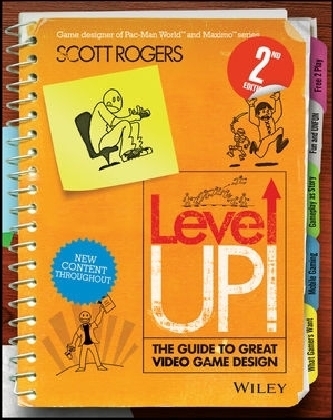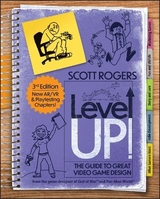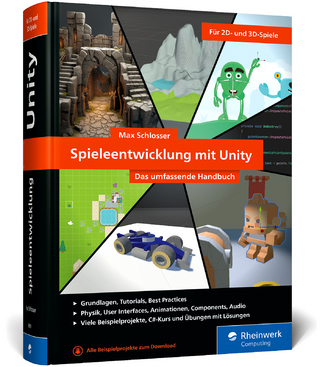
Level Up! The Guide to Great Video Game Design
John Wiley & Sons Inc (Verlag)
978-1-118-87716-6 (ISBN)
Want to design your own video games? Let expert Scott Rogers show you how!
If you want to design and build cutting-edge video games but aren’t sure where to start, then the SECOND EDITION of the acclaimed Level Up! is for you! Written by leading video game expert Scott Rogers, who has designed the hits Pac Man World, Maximo and SpongeBob Squarepants, this updated edition provides clear and well-thought out examples that forgo theoretical gobbledygook with charmingly illustrated concepts and solutions based on years of professional experience.
Level Up! 2nd Edition has been NEWLY EXPANDED to teach you how to develop marketable ideas, learn what perils and pitfalls await during a game’s pre-production, production and post-production stages, and provide even more creative ideas to serve as fuel for your own projects including:
Developing your game design from the spark of inspiration all the way to production
Learning how to design the most exciting levels, the most precise controls, and the fiercest foes that will keep your players challenged
Creating games for mobile and console systems – including detailed rules for touch and motion controls
Monetizing your game from the design up
Writing effective and professional design documents with the help of brand new examples
Level Up! 2nd Edition is includes all-new content, an introduction by David “God of War” Jaffe and even a brand-new chili recipe –making it an even more indispensable guide for video game designers both “in the field” and the classroom.
Grab your copy of Level Up! 2nd Edition and let’s make a game!
Scott Rogers (Thousand Oaks, CA) is a Principal Imagineer at Walt Disney. After deciding that game designers have more fun, Scott embarked on a career creating game designs for a number of successful titles including Sony's GOD OF WAR, Capcom's MAXIMO: GHOSTS TO GLORY and its sequel MAXIMO VS. ARMY OF ZIN, Namco's PAC-MAN WORLD and THQ's DRAWN TO LIFE series. He lives in Thousand Oaks with his family and a large collection of video games.
Introduction Press Start! 1
If You Are Anything Like Me 1
No, You Can’t Have My Job 3
Who Is This Book For? 4
Why a Second Edition? 6
Level 1 Welcome, N00bs! 7
A Brief History of Video Games 10
The Brave New World of Gaming: Mobiles, Online Distribution, and Touchscreens 14
Game Genres 16
Who Makes This Stuff? 17
Programmer 18
Artist 19
Designer 20
Producer 20
Tester 21
Composer 22
Sound Designer 23
Writer 23
Have You Thought about Publishing? 25
Product Manager 25
Creative Manager 25
Art Director 26
Technical Director 26
Marketing Team 26
And the Rest 26
Level 2 Ideas 29
Ideas: Where to Get Them and Where to Stick Them 30
Getting Ahead of the Game 32
What Do Gamers Want? 35
Brainstorming 36
Breaking Writer’s Block 38
Why I Hate “Fun” 40
Level 3 Writing the Story 43
Once Upon a Time 43
The Triangle of Weirdness 50
A Likely Story 52
Time to Wrap It Up 55
A Game by Any Other Name 56
Creating Characters Your Players Care About 58
A Few Pointers on Writing for Kids of All Ages 62
Writing for Licenses 62
Level 4 You Can Design a Game, but Can You Do the Paperwork? 65
Writing the GDD, Step 1: The One-Sheet 68
ESRB Ratings 69
Unique Selling Points 70
Competitive Products 70
Writing the GDD, Step 2: The Ten-Pager 71
The Rule of Threes 72
The Ten-Pager Outline 73
Page 1: Title Page 73
Page 2: Game Outline 73
Page 3: Character 74
Page 4: Gameplay 75
Page 5: Game World 76
Page 6: Game Experience 76
Page 7: Gameplay Mechanics 77
Page 8: Enemies 79
Page 9: Multiplayer and Bonus Materials 80
Page 10: Monetization 80
Writing the GDD, Step 3: Gameplay Progression 81
Writing the GDD, Step 4: The Beat Chart 82
Writing the GDD, Step 5: The Game Design Document (and the Awful Truth about Writing It) 85
Writing the GDD, Step 6: Above All, Don’t Be a Jerk 89
Level 5 The Three Cs, Part 1: Character 93
Who Do You Want To Be Today? 94
Personality: Do We Really Need Another Kratos? 96
Let’s Get Personal 98
Using All the Parts 102
Games Without Characters 103
We Are Not Alone 104
When More Is More 107
Who Are the People in Your Neighborhood? 109
Finally, We Talk About Gameplay 111
Metrics for Non-Characters 114
Be Kind to Our Four-Legged Friends 114
Why Walk When You Can Run? 114
The Art of Doing Nothing 119
Might as Well Jump 120
Hoists and Teeters 124
What Goes Up Must Fall Down 125
Me and My Shadow 126
The Water’s Fine . . . or Is It? 127
Level 6 The Three Cs, Part 2: Camera 131
Get It Right: Camera Views 132
First Person Camera 136
Third Person Camera 138
Giving Up Control 142
So You’ve Decided to Let the Player Control the Camera 142
So You’ve Decided Not to Let the Player Have Control over the Camera 144
So You’ve Decided to Let Players Sometimes Have Control over the Camera 145
Two and a Half D 145
Isometric Camera 146
Top-Down Camera 148
AR Cameras 149
Special Case Cameras 149
Tunnel Vision 150
Camera Shot Guide 150
Camera Angle Guide 153
Camera Movement Guide 154
Other Camera Notes 157
Always Point the Camera to the Objective 158
Never Let the Character Get out of the Camera’s Sight 159
Multiple-Player Cameras 159
Level 7 The Three Cs, Part 3: Controls 163
Control Is in Your Hand 164
You’ve Got the Touch 167
Dance, Monkey, Dance 169
Character or Camera Relative? 175
Shake, Rattle, and Roll 177
Level 8 Sign Language: HUD and Icon Design 181
Heads Up! 181
Health Bar 182
Targeting Reticule 183
Ammo Gauge 184
Inventory 185
Score/Experience 185
Positive Messaging 186
Radar/Map 187
Context-Sensitive Prompts 188
The Clean Screen 190
Icon Has Cheezburger? 191
Creating Icons for Mobile Games 194
Don’t Get QTE 196
HUDs and Where to Stick ‘Em 198
There Are Other Screens Than the HUD 199
A Final Word on Fonts 207
Level 9 Everything I Learned About Level Design, I Learned from Level 9 209
The Top 10 Cliché Video Game Themes 212
The Name Game 218
Everything I Learned About Level Design, I Learned from Disneyland 220
Mapping the World 221
Foreshadowing 222
Goal Setting 223
Following Procedure 225
You’ve Got the Beat 227
Re-using Re-use 229
The Gary Gygax Memorial Mapping Section 230
Sandbox Play 233
Illusional Narrative 236
The Dave Arneson Memorial Mapping Section 237
Wrapping Up Mapping 248
Gray Matters 251
Leave the Training Level for Last 253
Levels without Characters 254
Level 10 The Elements of Combat 257
400 Quatloos on the Newcomer! 259
Put ‘Em Up! 262
And a One and a Two 266
The Big Finish 268
Live by the Sword 270
Now You Have to Kiss Me 273
Let’s Get Defensive 273
Dodging the Bullet 276
On Guarding 277
State of the Art Bang Bang 281
The Best Gun for You 286
Run and Gun 290
Not Just Shooting 293
Dang it, Jones! Where Doesn’t It Hurt? 297
Death: What Is It Good For? 299
Conflict Without Combat 301
Level 11 They All Want You Dead 305
Sizing Up the Enemy 307
Bad Behavior 308
How Rapid is Rapid? 313
Movement Style 316
Bring on the Bad Guys 318
I Love Designing Enemies 327
The Alphabetical Bestiary of Choices 328
I Hate You to Pieces 337
Non-Enemy Enemies 341
How to Create the World’s Greatest Boss Battle 342
Who’s the Boss? 342
Size Matters 344
Location, Location, Location 349
Why Not to Create the World’s Greatest Boss Battle 351
Level 12 The Nuts and Bolts of Mechanics 353
The Mechanics of Mechanics 353
Holy Death Trap! 357
What I Learned from Making Kids Cry 360
Time to Die 361
The Music of Mechanics 364
Chip Off the Old Block 368
A Nice Little Calm Spot 371
Riddle Me This 372
Puzzle Me That 375
Minigames and Microgames 377
Level 13 Now You’re Playing with Power 381
Powering Up 381
“Love Thy Player” 388
Seriously. “Love Thy Player.” 390
More Wealth Than You Can Imagine! 391
High Score 394
Achievements 395
Money! Money! Money! 395
Souvenirs 399
Bonus Section about Bonus Features 400
How to Win at Losing 402
Level 14 Multiplayer—The More the Merrier 405
How Many Is the Right Number? 410
MMORPGS, or Hell Is Other People 410
Designing Multiplayer Levels 415
Planning Your Level 415
Mapping Your Level 416
Building Your Level 417
The Dirty Half Dozen 418
Level 15 Everybody Wins: Monetization 419
Cashing In 422
Money Is the Root of Something Something 423
Level 16 Some Notes on Music 427
I Know It When I Hear It 429
Music with Style 430
And the Beat Goes On 431
Sounds Like a Game to Me 434
Level 17 Cutscenes, or No One’s Gonna Watch ‘Em Anyway 441
A Cut Above 442
How to Write a Screenplay in Eight Easy Steps 444
Finding Your Voice 448
Level 18 And Now the Hard Part 451
No One Cares About Your Stupid Little World 452
Who’s Paying? 455
Video Games Is a Haaaard Business 456
When Reality Gets in the Way 457
Emergent, Vertical, or Horizontal? 459
What to Do for an Encore? 462
Continue? 467
Time to Level Up! 467
Bonus Level 1
The One-Sheet Sample 469
Bonus Level 2
The Ten-Page Design Document Sample 473
Bonus Level 3
Game Design Document Template 485
Bonus Level 4
The Medium-Sized List of Story Genres 493
Bonus Level 5
Game Genres 495
Bonus Level 6
The Big List of Environments 503
Bonus Level 7
Mechanics and Hazards 507
Bonus Level 8
Enemy Design Template 509
Bonus Level 9
Boss Design Template 511
Bonus Level 10
High-Concept Pitch Presentation 513
Bonus Level 11
Achievement Unlocked: Exactly Like Making Chili 521
Index 523
| Verlagsort | New York |
|---|---|
| Sprache | englisch |
| Maße | 191 x 239 mm |
| Gewicht | 794 g |
| Themenwelt | Schulbuch / Wörterbuch ► Lexikon / Chroniken |
| Mathematik / Informatik ► Informatik ► Programmiersprachen / -werkzeuge | |
| Informatik ► Software Entwicklung ► Spieleprogrammierung | |
| ISBN-10 | 1-118-87716-0 / 1118877160 |
| ISBN-13 | 978-1-118-87716-6 / 9781118877166 |
| Zustand | Neuware |
| Informationen gemäß Produktsicherheitsverordnung (GPSR) | |
| Haben Sie eine Frage zum Produkt? |
aus dem Bereich



